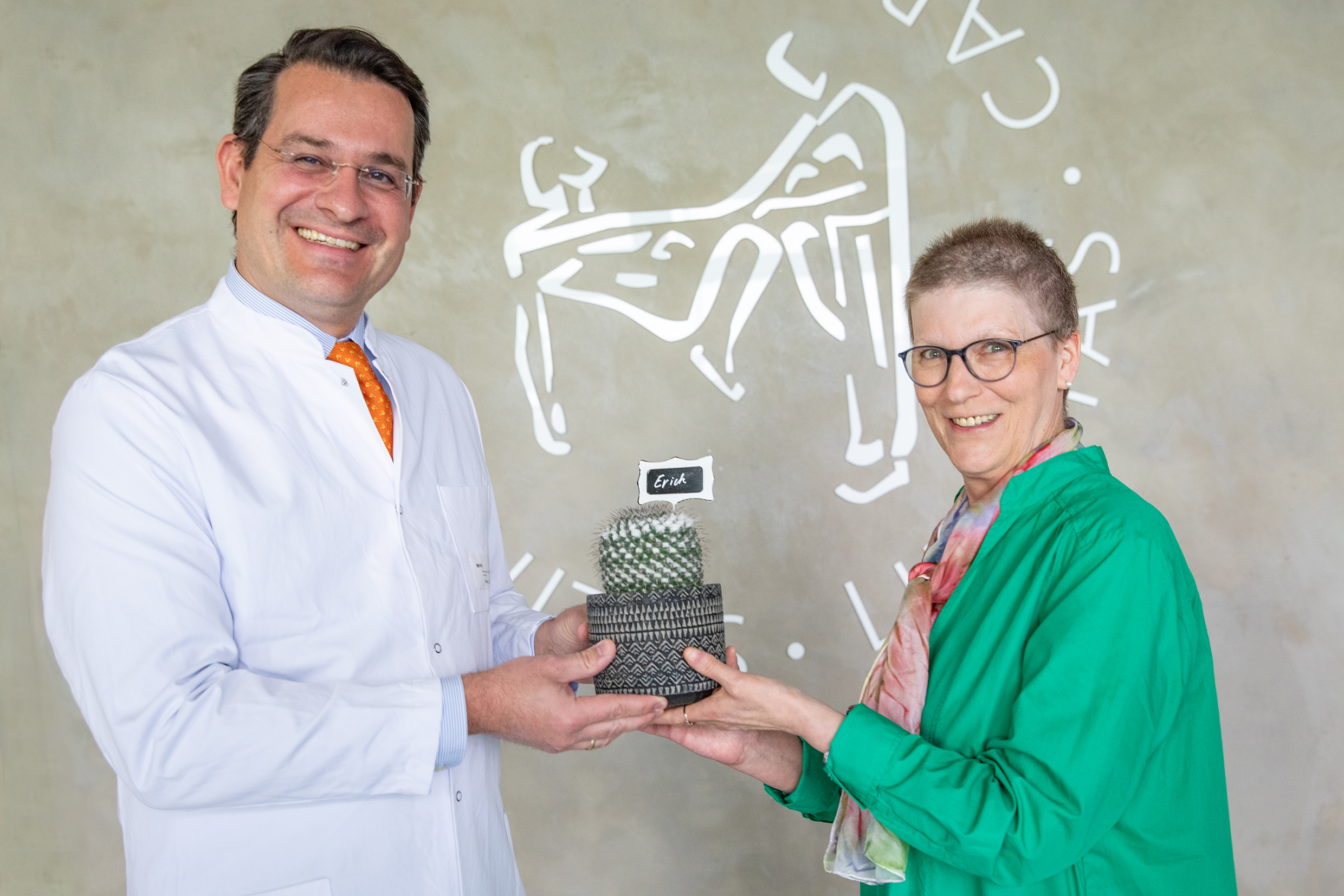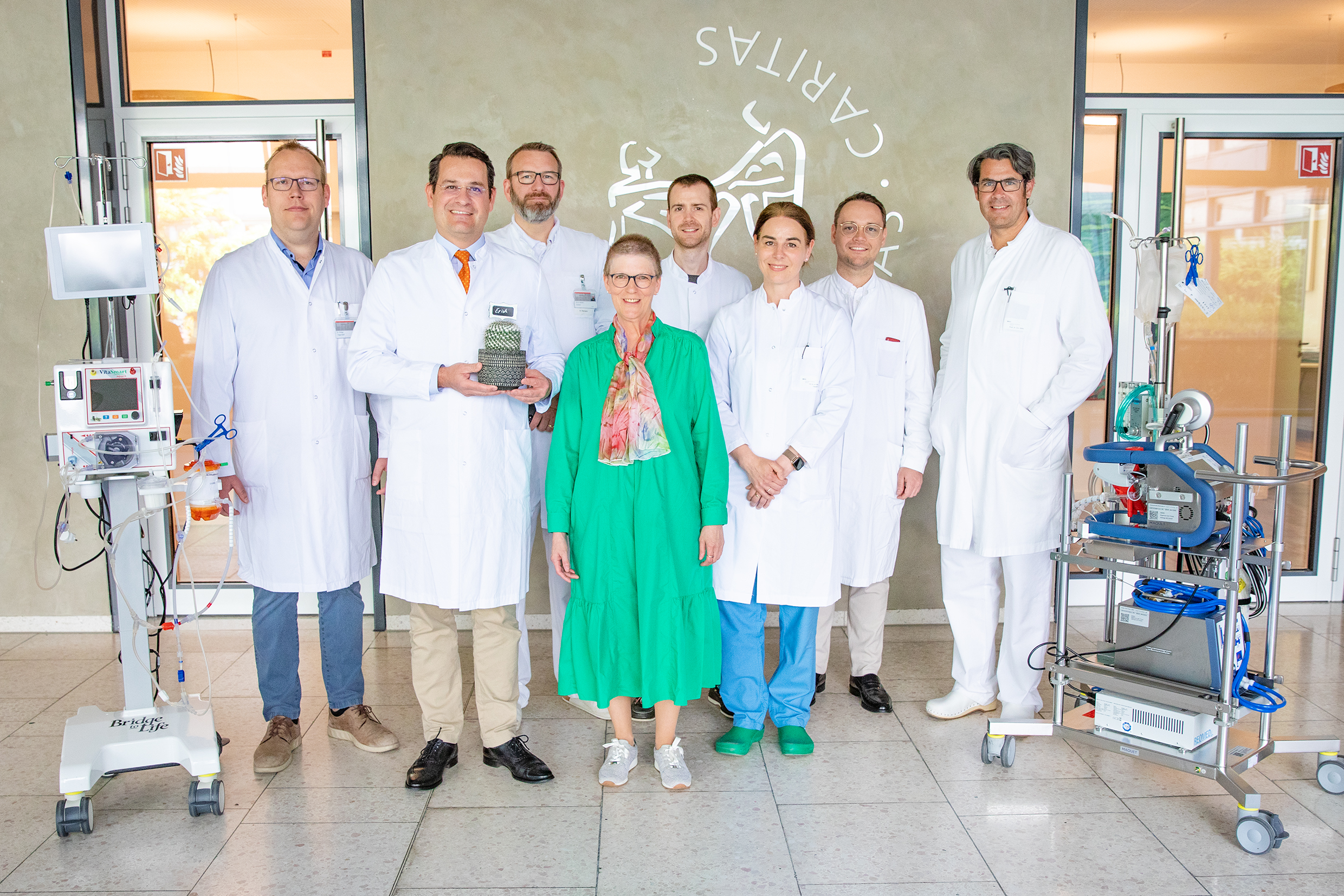A tumour classified as inoperable, a decades-old idea, state-of-the-art technology – and a team that fully exploits the possibilities of cancer therapy: At the MHH, a patient with bile duct cancer has been given a new chance at life.

Copyright: Karin Kaiser/MHH

Copyright: Karin Kaiser/MHH
When Susanne Viehmeier was diagnosed with bile duct cancer in 2022, she named her tumour ‘Erich’ – and although her ‘new roommate,’ as she calls the tumour, was deemed inoperable, she never gave up hope. This April, the 62-year-old left the Hannover Medical School (MHH) eight days after undergoing innovative surgery. As a farewell gift, she presented Prof. Dr. Moritz Schmelzle, Director of the MHH Clinic for General, Visceral and Transplant Surgery and Head of the Transplant Centre, with a cactus named ‘Erich’.
The procedure that changed her life is based on an idea by renowned transplant physician Prof. Dr. Rudolf Pichlmayr – taken up by an interdisciplinary team led by Professor Schmelzle and combined with the possibilities offered by modern medicine today to create a new surgical technique. On 1 April 2025, the world's first operation using the new surgical technique took place. Within four and a half hours, the malignant tumour originating in the bile ducts was removed, even though it had affected all three hepatic veins.
Liver disconnected from the bloodstream
The hepatic veins carry oxygen-poor blood from the liver to the inferior vena cava, which in turn returns it to the heart. Professor Pichlmayr's decades-old idea of operating on a diseased organ outside the body was implemented by separating the liver from the blood circulation of the rest of the body. To do this, the physicians used extracorporeal membrane oxygenation (ECMO), a technique commonly used as a heart-lung machine. A team led by Prof. Dr. Christian Kühn from the Clinic for Cardiac, Thoracic, Transplant and Vascular Surgery worked together with the anaesthesia team led by Dr. Hendrik Eismann, Clinic for Anaesthesiology and Intensive Care Medicine, to maintain circulation.
The liver, in turn, was given its own circulation via organ perfusion, a technique otherwise used in transplant medicine, but without blood. The perfusion device simultaneously cooled the liver by a few degrees Celsius using an oxygen-rich nutrient solution. ‘We were only able to reconstruct a hepatic vein in the operating theatre because the liver was drained of blood. Thanks to the controlled cooling and continuous oxygen supply, we had enough time to do this. Everything went smoothly’ explains Professor Schmelzle.
A total of two operations were necessary
A lobe of the liver had to be removed along with the tumour. The remaining lobe was able to take over liver function on its own because Susanne Viehmeier had already undergone surgery eight days before the actual operation. During this procedure, the liver was split and the blood circulation was redirected so that the lobe could grow.
Experimental therapy makes tumour operable
The operation was only made possible by a new drug. ‘Thanks to a colleague from Wolfsburg Hospital, the patient was referred to the Molecular Tumour Board (MTB) at the MHH at the end of 2023,’ explains Dr. Anna Saborowski, senior physician at the Clinic for Gastroenterology, Hepatology, Infectiology and Endocrinology (Director: Prof. Dr. Heiner Wedemeyer). ‘This enabled Ms Viehmeier to receive personalised and targeted cancer treatment. Thanks to experimental therapy outside the standard treatment protocol, the tumour has shrunk in size and better conditions for surgery have been created.’ The MTB enables genetic changes in a tumour to be identified through advanced molecular diagnostics. It follows on from the tumour conference, which is a regular interdisciplinary meeting of experts to determine the best course of treatment for cancer patients.
Expertise for complicated cases at the CCC
‘Our task as a supra-regional Comprehensive Cancer Centre (CCC) is to assess complicated cases. Ms Viehmeier's treatment shows the progress we have made in systemic and surgical tumour therapy," says Professor Schmelzle. ‘As a certified liver centre, we can still offer a chance of recovery even in cases that seem hopeless.’
Susanne Viehmeier says she is doing ‘excellent.’ In the autumn, she and her husband Holger will celebrate their 40th wedding anniversary and are now hoping for their golden wedding anniversary in ten years.
Text: Inka Burow und Camilla Mosel